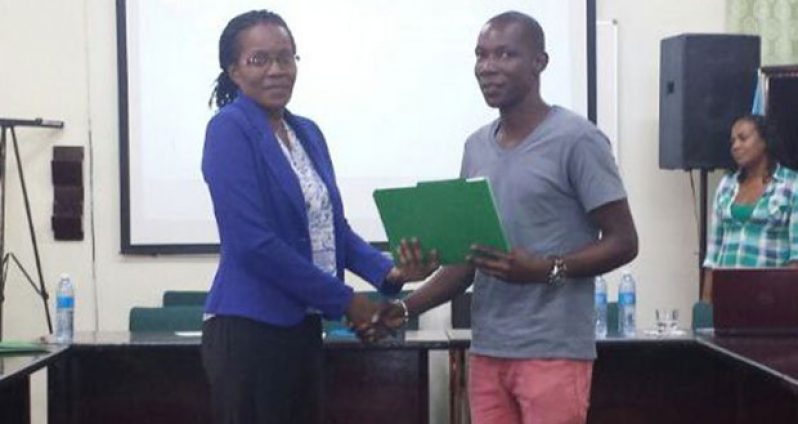SEVERAL small loggers are reaping the benefits of a timber-harvesting and forest- monitoring model project aimed at improving compliance with the relevant laws and best practices in the industry,.According to a release from the Guyana Forestry Commission (GFC), the project which has received the support of the European Union and the/ Food and Agriculture Organisation (FAO) was revised on the basis of discussions with the small loggers associations and other stakeholders.
It has resulted in a revised focus on developing a forest-harvesting model and field-testing the model in collaboration with six small loggers associations in the Upper Berbice region.
Those associations include the Aroaima Forests and Agricultural Producers Association, Horuru Forests and Agricultural Producers Association, Ituni Small loggers and Chainsaw Operators Association, Kwakwani Natural Resources Organisation, Maria Elizabeth Three Friends Small Loggers Associations and the Upper Berbice Forests Producers Associations. The project was implemented over a 13-month period with US$122,000 in support.
The release said the Forestry Training Centre Incorporated (FTCI) in collaboration with the GFC recently met with stakeholders at a forum to bring closure to the EU/FAO project which is titled: “Develop a pilot timber-harvesting and forest- monitoring model for small loggers associations to improve compliance with the forest laws and agreed forest-management prescriptions in Guyana”.
The project was initially submitted by Upper Berbice Forests and Agricultural Producers Associations (UBFPA) to the European Union Forest Law Enforcement, Governance and Trade (EU-FLEGT) programme as a means of building capacity of three associations in the Upper Berbice River area in Forest Governance in order to test the Legality Assurance System of Guyana.
According to the GFC, the objectives of the project are aimed at developing a timber-harvesting and forest-monitoring pilot model for one concession each from the small loggers associations in the Upper Berbice region.
The objectives include improving the capacity of six small loggers associations to manage their concessions, develop a mechanism for transferring data and information flows between the concessionaires and GFC and conduct field-testing of the monitoring protocols.
COMMITTED
GFC Commissioner James Singh noted that the forestry body stands committed to ensuring communities continue to benefit from technical support provided by the Forestry Training Centre Incorporated.
He said that in keeping with the FLEGT Voluntary Partnership Agreement (VPA), the logging associations have greatly benefited from the assets received and the capacity development. In this regard, he said that they are better prepared to meet the requirements of the VPA.
Singh said vocational training of the forestry sector is an on-going activity being undertaken by the Forestry Training Centre Incorporated. He expressed appreciation to the FAO and the EU for their continuous support of initiatives aimed at empowering loggers.
FAO Resident Representative, Reuben Robertson, also thanked the EU for its continued partnership with the FAO in ensuring that relevant projects are realised.
It was further emphasised that the FAO and the EU support the strides being made by Guyana in the VPA development, and as such, achieving the project outcomes will be beneficial to both the loggers and the country.
Robertson pointed out that the project supported loggers who are now able to monitor their concessions through capacity development and with the equipment received, a constraint of loggers has been remedied.
Clayton Hall , Advisor on Sustainable Development at the Ministry of Natural Resources, said the Government is focused on ensuring transparency in governance; as such, logging has to be conducted in a manner that is transparent and within the laws of Guyana.
He highlighted the strides being made by Guyana in the FLEGT VPA and stated that often the importance of Governance is neglected in management of the forests as a resource.
As such, he said the Ministry of Natural Resources is proud that the project has resulted in capacity development of small loggers, while providing them with needed equipment to ensure their forest-monitoring practices are improved.
Manager of the Forestry Training Centre Incorporated, Quacy Bremner, provided valuable insight into the project and its outcomes. The presentation highlighted the critical successes of the project and offered recommendations for future areas to be addressed.
This was reinforced by representatives of each of the associations who stated their gratitude for improvement of their livelihoods through the capacity development provided by the Forestry Training Centre Incorporated and the equipment received.
It was noted that the logging associations are already seeing the benefits of the project through improvements in their logging and record-keeping practices. At the conclusion of the forum, certificates were presented to members of the logging associations.
‘Best practices’ training for small loggers
SHARE THIS ARTICLE :
Facebook
Twitter
WhatsApp



.jpg)








